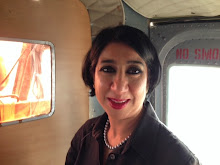The first story which catches my eye is the situation in Pakistan, specifically Karachi, where the political violence erupting is the worst seen in twenty years. The giant port city of 15 million people is sometimes a killing field with its sprawling, high-rise tenements, drugs, carjackings, mafia racketeering, dawn raids, and cordon and search operations. It is a fascinating place to try to operate from for hostile environment-trained reporters.
The tensions arising from the ethnic mix of around 13 million Urdu-speaking Mohajirs, immigrants who fled to Pakistan from India, Pashtuns from the North West Frontier Province (where my father was born,) and Sindhis, already provide the ingredients for a powerful, Karachi-flavoured Molotov.
Add to the mix the street battles arising from General Musharraf's suspension of his Chief Justice Iftikhar Chaudhry, (described by commentators as a manoeuvre to help the President win a second term in office,) the thousands of paramilitary rangers deployed onto Karachi's roads, and the bloodletting is almost a foregone conclusion.
This sort of situation brings Pakistan and Karachi onto the international news agenda because of heightened interest in the area since 9/11. It wouldn't have produced so much as a blip on the radar in our Western newsrooms prior to those cataclysmic events.
But it still figures only for a short while. There is still an 'over there' approach to the story, as in, 'hey guys, make a note, there's trouble over there again.'
What colleagues fail to report on is the importance to us over here in the UK.
What is the relevance for Britons?
The dominant Karachi ethnic group, the Mohajirs, are supporting President Musharraf, himself a Mohajir,by coming out onto the streets.
The Mohajirs were never actually viewed as proper native Pakistanis when they first came to Pakistan, they were never referred to as 'sons of the soil.' Though many of them are literate and professional, they faced discrimination. So they formed a political cluster, the MQM, to represent their interests.
Led by Altaf Hussein, the movement commands over 30 million Pakistanis. If Hussein gives the word, Karachi, the commercial capital of Pakistan, and other towns in Sindh province can be brought to their knees with complete standstills. Years ago, Altaf Hussein came to England as an exile and now runs the MQM from his state-of the-art high security headquarters in London. Not a lot of international journalists are allowed access.
I have met and interviewed him, and I have watched him broadcast live into Karachi via a telephone from his desk. The powerful oratory is relayed via loudspeakers to gatherings of thousands of his followers.
Many Mohajirs live in London, some of them having successfully sought asylum. Quiet but committed, they are closely involved in their leader's thoughts and actions. They are British Pakistanis, most of them are working here and rearing their families with aplomb.
I attended Altaf Hussein's wedding reception at Alexandra Palace in London. The cream of Pakistani pop music and comedy talent had been flown over for the occasion. The man who can paralyse Pakistan's port was surrounded by some powerful players.
We need to understand that 'over there' is now 'over here.'
International borders have little significance on the world stage.
We are all witnesses to the action; we are all involved.
Wednesday, 23 May 2007
Subscribe to:
Post Comments (Atom)


No comments:
Post a Comment